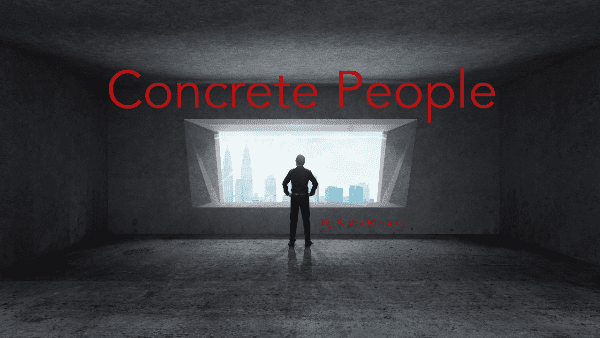
This is God.

This is God.

This is God.

This is God.

This is God.

This is God.

It’s relatively easy for us to imagine God as the totality of the universe or the subatomic workings of multiple material worlds. And I think more of us than not understand Jesus, Krishna, Buddha, and others as incarnations, prophets, or avatars of God.
Seeing God in the Marjory Taylor Greenes of the world is more challenging. Yet, if we believe God is more than a Marvel Studios caricature reclining on a cosmic rocket chair; if we genuinely appreciate God as the fundamental Love energy of the multiverse; if we are practicing seeing the world through the nondual consciousness of Jesus and Buddha, then we must recognize and wrestle with God’s love manifest in disagreeable — perhaps even dangerous — people.
If we have trouble wrapping our minds around the idea that God is manifest in both warmongers and peace-bringers, consider the story of Noah, Job, or the genocides of the Canaanites and Egyptian firstborn. God is pretty nasty in the First Testament: flooding the world, torturing faithful disciples, literally thwarting the Israelite’s freedom by hardening Pharaoh’s heart, and generally demanding fealty and worship lest “He” throw a Trumpian-style infantile fit and make the fields lay fallow for a generation.
That God is an egotistical megalomaniac throughout much of the First Testament is not a commentary on the nature of God but on our own. Most people read the First Testament incorrectly, which is why many Christians still wrongly believe there are two different Gods in the Bible (an idea called Marcionism that the early church quickly and correctly squashed). God’s behavior in the First Testament is an ingenious warning against making God in our image.
Imagining God looks and acts like us — full of hate, ready to go to war — is perhaps the most blasphemous thought possible. Thinking God is “on our side” creates religions of hatred and fear, thick-walled, frigid concrete bunkers of heartless psychosis.

Millions of concrete people live in these self-made prisons, and they are as impenetrable. Reason, facts, science and history, compassion, concern for the common good and the public welfare, are all lost on the concrete people, whose thickness must be obliterated if they are to see anew. As Paul says, no longer through a mirror dimly, but now, with a consciousness that sees the gloriously inclusive totality of reality (1 Cor. 13:12).
Jesus, even though he is misunderstood and abused by the concrete people who loudly proclaim his name and violently thump a Bible he wouldn’t recognize, Jesus rescues — Jesus saves us from turning to stone, trapped in the concrete bunker. Not because he was crucified, but because he teaches and shows us how to practice genuinely unconditional love. The only energy that eradicates fear and replaces hate with understanding.
Love pulverizes concrete.
The peaceful, equitably prosperous, happy and free global society Jesus imagined — and tasks his disciples with creating — will never happen as long as we remain concrete people too afraid to leave the closed-minded but comfortable bunkers of our biased and bigoted psyches.
Jesus shows us how to dissolve our concrete barriers and break through the walls of the bunker. His willingness to sit, eat with, and touch society’s untouchables is perhaps his most shockingly powerful and important act. By ignoring society’s rules about who can do what with (and to) whom, Jesus jackhammers the idea someone isn’t good enough to eat with the king or that any of us are so magnificent that we’re too good to eat with someone else. Jesus ate with lepers and tax collectors. Would you have dinner with Marjory Taylor Greene? Nancy Pelosi? Barack Obama? Donald Trump?
If you’re a follower of Jesus, the only answer to all of these invitations is an unequivocal “Yes.”
But Jesus also makes it clear that to commune with someone — to send God’s love to someone we disagree with — does not mean we accept and support their heinous politics or theology. Jesus preaches “love your enemy” but calls his adversaries out for their hypocrisies. Loving the MTGs of the world does not mean approving of their thoughts and actions, merely that we acknowledge everyone is created of the same fundamental God material as we. If we’re all fundamentally God, and God is love, then we are all love.
Whatever God-force exists in us, compelling us to think about new, more equitable and compassionate global systems is also in everyone, whether or not they agree with us and vice-versa. Somewhere, buried beneath all those layers of intolerance, itself caused by fear and uncertainty, deep in every bigoted persona, the spark of God’s unconditional, compassionate love brightly burns. It just has to be found. Fortunately, Jesus has some great instructions on how to light the darkness:
Luke 6:27–31 (CEB)
But I say to you who are willing to hear: Love your enemies. Do good to those who hate you. Bless those who curse you. Pray for those who mistreat you. If someone slaps you on the cheek, offer the other one as well. If someone takes your coat, don’t withhold your shirt either. Give to everyone who asks and don’t demand your things back from those who take them. Treat people in the same way that you want them to treat you.
We break the barriers of fear, uncertainty, and hate, by practicing love. Be love. Do love. Love everything. Don’t just talk about it, do it. Love yourself. Love your families, your grocer, and your congressperson. Love Putin. Love Trump. Love Hillary. Love MTG because it’s obvious she needs it. Lots of it. Learn how to do love, like Jesus.
What does it mean to do love? How can we exude love in a visceral way so it’s not just more useless “thoughts and prayers?” The world doesn’t need more platitudes. It needs love.
Doing love means we actively radiate understanding to even those we do not understand.
Doing love means we are compassionate, especially to those who would withhold compassion from others.
Doing love means we feed the hungry and encourage the wealthy to contribute more to the poor.
Doing love means we teach the politics of Jesus’ demand that his disciples build a new society from the bottom up instead of goose-stepping with the empire.
Doing love means we use every implement our communities and governments provide — and invent new ones if necessary — to peacefully resist our continued commoditization and dehumanization.

I recently tried an experiment on the subway. I looked at people and tried to love them. The way Jesus says we should love our neighbor and our enemy: as ourselves. I did my best to channel God’s Love through my entire being, then intentionally direct it to other people on the train.
From God, through God, to God…
I sent feelings of compassion and understanding and meditated on the idea that we are essentially one God particle in a physical space that, in this instance, just happens to be manifesting as a train full of strangers riding through a hole in the ground — a metaphor that has not gone unnoticed but which we’ll have to come back to another day.
Doing love — not just abstracting about it, was an exceptionally difficult exercise. For one thing, staring at someone on the train is like saying, “Hey! Please come stab me!” But more importantly, it’s hard to love a stranger.
Our culture places so much emphasis on romantic love that we struggle to imagine loving someone without romantic feelings attached. But it’s agape love that Jesus proclaims, which is God’s love: benevolent and filled with goodwill for all creation.
When Jesus commands us to love, it’s with all our hearts, yes, but also with all our minds and souls. Jesus commands his followers to love much more profoundly, filled with God’s agape love, which isn’t a flight of romantic fantasy but is instead demanding, difficult, committed, faithful, transcendent love that reminds us God exists not only in the people we like but also in the people we don’t. Because God’s love is unconditional.
And ours should be, too.
Amen.
Question: Where are you too concrete?


